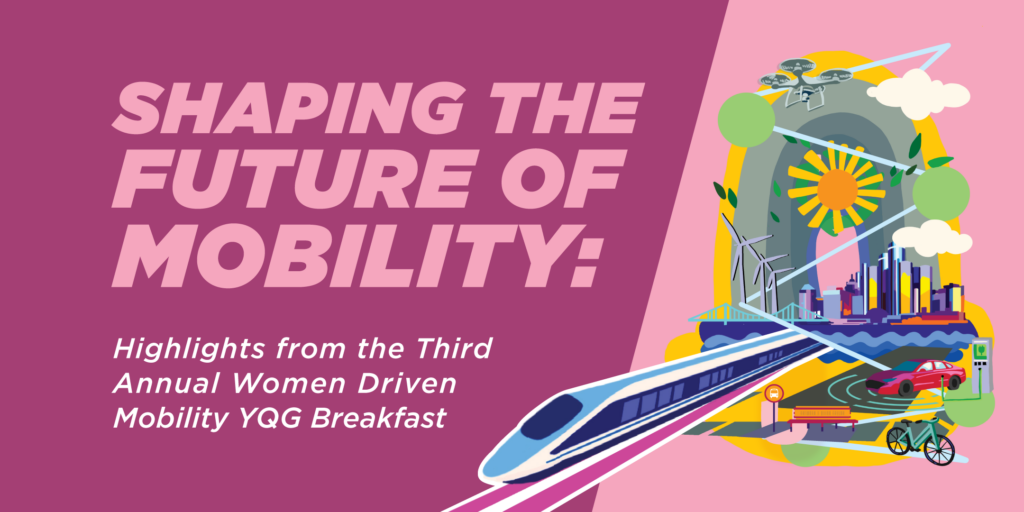Home » Shaping the Future of Mobility: Highlights from the Women-Driven Mobility YQG Breakfast
Shaping the Future of Mobility: Highlights from the Women-Driven Mobility YQG Breakfast

At the third annual Women-Driven Mobility YQG Breakfast, hosted by WEtechAlliance and powered by Build a Dream, nearly 80 members of the mobility community—including women leaders, entrepreneurs, students, researchers, and community members—gathered to explore the future of transportation. Since its launch in 2020, in partnership with Women in Mobility Detroit and the late Susan Anzolin, this annual event and the Women in Mobility program have become essential platforms for fostering discussions on innovation, inclusivity, and collaboration within the mobility sector.
“We need more women in the room when decisions are made—whether it’s on the ground floor of innovation or in boardrooms shaping public policy,”
The event featured a powerful keynote from Dr. Josipa Petrunic, President and CEO of the Canadian Urban Transit Research and Innovation Consortium (CUTRIC). Dr. Petrunic shared insightful perspectives on the future of mobility, emphasizing the critical role of cross-sector collaboration in advancing transportation technologies. Her presentation, titled “Smart Vehicles and Sustainable Cities,” delved into the transformative potential of hydrogen and electric vehicles (EVs), the importance of empowering women in leadership roles, and the strategic positioning of Windsor in the EV revolution.

Spotlight on Women Leaders in Mobility
Throughout the room, spotlight posters and audience guests highlighted exceptional women leading various areas of the mobility industry. Among them were:
- Dhwani Shah, PhD, founder of Aadhya Navik Inc., is developing software solutions to enhance safety, comfort, and efficiency in autonomous vehicles.
- Nicole Lokanath, owner of Taurean EV Charging Solutions, is focused on expanding EV charging infrastructure, helping businesses prepare for the electric future.
- Dr. Mitra Mirhassani and Dr. Ikjot Saini from SHIELD Automotive Cybersecurity Centre of Excellence are pioneering advancements in automotive cybersecurity.
- Dr. Oyeyi Ezeh is advancing research on sustainable transportation infrastructure
- Sandy Ilievski, Plant Manager at Ford Motor Company, known for her constant leadership and commitment to DEI within the automotive community.

Key Takeaways from Dr. Petrunic’s Keynote
1. Hydrogen and Electrification Are Driving Mobility
Dr. Petrunic highlighted the pivotal role of hydrogen and electric vehicles (EVs) in the future of urban transit. She emphasized the urgency of adopting cleaner technologies as governments and organizations worldwide commit to sustainability goals.
“We’re no longer talking about technologies of tomorrow; they’re already here, transforming cities today,” Dr. Petrunic remarked, underscoring that both hydrogen fuel cells and EVs are essential in reducing transportation’s carbon footprint. These technologies are especially crucial for public transit systems, which are among the first to embrace electrification to meet climate targets.
2. Cross-Sector Collaboration is Essential for Success
A central theme of Dr. Petrunic’s keynote was the necessity for collaboration across different sectors. She stressed the importance of partnerships between public transit authorities, academic institutions, and private companies to foster innovation and overcome the challenges posed by emerging mobility technologies.
“Real progress happens when we bring the brightest minds together. The future of mobility depends on strong public-private partnerships,” she stated, highlighting that no single sector can drive mobility forward alone.

3. Empowering Women in Mobility
Dr. Petrunic called for more women to step into leadership roles within the mobility industry. Drawing from her own experiences, she highlighted the critical need for women to be involved in decision-making processes, whether in innovation, technology, or public policy.
“We need more women in the room when decisions are made—whether it’s on the ground floor of innovation or in boardrooms shaping public policy,” she urged, emphasizing the value of diverse perspectives in creating more inclusive mobility solutions.
4. Smart Mobility and Autonomous Vehicles
Dr. Petrunic detailed CUTRIC’s ongoing projects, including autonomous vehicle demonstration trials that test the viability of using autonomous shuttles for first- and last-kilometer transit solutions. She outlined key challenges such as the operational difficulties of deploying AVs in mixed traffic and the need for greater funding and technological advancements for large-scale implementation.
“Autonomous vehicles have the potential to completely transform urban mobility, but we need to address the current challenges head-on,” Dr. Petrunic stated. “If we can overcome these obstacles, we’ll be paving the way for smarter, more sustainable cities where people rely less on private cars and more on efficient, shared transportation options.”

5. Windsor: A Key Player in the EV Revolution
Dr. Petrunic underscored Windsor’s unique position as a leader in the electric vehicle (EV) movement, leveraging the city’s rich automotive history. While Windsor’s strong foundation in manufacturing offers a natural advantage in transitioning to EVs, proactive steps are essential to secure its place in this rapidly evolving industry.
“Windsor has an incredible foundation—it’s home to some of the best talent in automotive manufacturing, and the city’s industrial heritage gives it a head start,” she explained. “But to truly lead the EV revolution, the city needs to invest heavily in the future.”
She identified two key areas for Windsor to lead: investing in EV infrastructure and developing a skilled workforce. Expanding the city’s electric charging and hydrogen fueling networks is crucial for both public and private sectors to adopt and support these technologies. Additionally, workforce development through collaboration with local governments, academic institutions, and businesses is vital to prepare for the jobs of tomorrow.
Windsor’s proximity to Detroit also offers a unique opportunity for cross-border collaboration. By aligning with Detroit’s EV efforts, Windsor could become part of a global automotive innovation powerhouse. “Windsor and Detroit can lead together, but it requires intentional effort and cooperation,” she concluded.

Comparing City Efforts in Mobility
From Dr. Petrunic’s presentation, examples of other cities’ efforts in mobility and green technologies were discussed, highlighting both positive and negative approaches.
Good Examples:
- Montreal and Vancouver have embraced electric bus adoption, leading the way in integrating standardized electric buses into their public transit systems.
- Toronto is actively involved in collaborative efforts to adopt zero-emission bus fleets, setting a benchmark for other cities.
Challenges:
- Ottawa has faced difficulties with its electric bus rollouts, citing a lack of coordination and strategic funding for infrastructure, which hampers its EV goals.
- Durham Region’s autonomous vehicle trials encountered technical issues and delays, emphasizing the importance of proper planning and risk management.
- Dr. Petrunic also highlighted the need for transit leaders to be based in the cities they serve, without providing parking spots for them. This bold step encourages reliance on

We extend our thanks to our partners—Invest WindsorEssex, the Province of Ontario, the Government of Canada (FedDev Ontario), and the City of Windsor—for their support in making this Women in Mobility program and annual event possible. A special thank you goes to Dr. Anneke Smit, who expertly moderated the event, guided insightful discussions. Her thoughtful approach significantly contributed to the success of the event, bringing out key themes and ideas that inspired all attendees.
To view the slides from our keynote speaker, Dr. Josipa Petrunic. For more stories about the women shaping the future of mobility, to explore their achievements and contributions.
WEtechAlliance
https://www.WEtech-alliance.com/
WEtech Alliance has served as a catalyst for technology and innovation in the Windsor-Essex and Chatham-Kent, Ontario regions since 2011. We’re a non-profit organization that provides entrepreneurs and companies with business services, training, I.P. and commercialization support, mentorship and strategic connections to help bring new ideas to market, scale to the next level and build a dynamic culture and a community of innovation.


